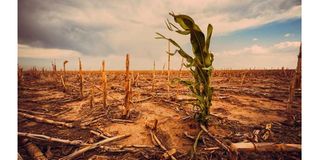UN Women launches knowledge hub for gender-related disasters

Extreme drought.
What you need to know:
- It helps in maximising knowledge exchange through blogs, case studies, webinars, and training supported by experts from the WRD Expert Register.
- There is rising awareness that disasters affect genders differently and this is confirmed by recent research by UN Women and Unicef.
The UN Women has launched a one-stop knowledge shop for gender-related disasters and climate resilience.
The agency has launched the global Women's Resilience to Disasters (WRD) knowledge hub in partnership with the Australian government.
The hub aims at making the lives and livelihoods of women and girls resilient to disasters, including climate-related and health pandemics.
It offers a wealth of resources, to help countries secure gender-responsive disaster risk reduction policy frameworks, processes, and practices, and placing women’s leadership at the centre stage.
Cetralised knowledge
UN Women Executive Director Sima Bahous, in a press release, said the new hub meets the pressing need for centralised knowledge, resources, good practices, and expertise.
“Around the world, women and girls lead the charge on climate change adaptation and disaster risk reduction. Their experience is a vital resource for others. The hub consolidates access to critical tools on women’s resilience to disasters and provides a platform for amplifying women’s voices,” said Ms Bahous.
The hub will include a searchable library of resources and publications; the WRD Policy Tracker identifying national and regional progress engendering policy and planning frameworks; the WRD Toolbox with guidance, training kits, and advocacy material.
It also consists of the WRD community of practice. This helps in maximising knowledge exchange through blogs, case studies, webinars, and training supported by experts from the WRD Expert Register.
The hub also brings together traditionally separate communities to share knowledge and good practice.
The programme is being implemented in the Pacific region, thanks to funding from the Australian government, with sister programmes being implemented in the Caribbean and the Lake Chad Basin.
Gender-specific impact
There is rising awareness that disasters affect genders differently and this is confirmed by recent research by UN Women and Unicef.
Women and girls were found to die in greater numbers and have different and uneven levels of resilience and capacity to recover.
For example, 95 per cent of deaths on the Solomon Islands during the 2014 flash floods were women, 55 per cent of deaths in the 2015 earthquake in Nepal were women and 59 per cent of those displaced following Cyclone Idai in 2019 in Malawi were women.
These findings have been confirmed by another study, which highlighted that women are 14 times more likely than men to die during a disaster.
Despite these disparities, critical gaps remain in the understanding of disaster and climate risks in managing the emerging evidence base, and in access to and uptake of tools for enabling gender-responsive disaster risk reduction and resilience.
Until now, information has been spread across different stakeholders, platforms, and programmes.



